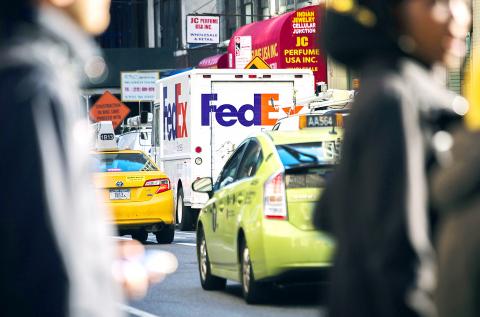Greg Richmond ordered two wool caps from Overland Sheepskin Co on Tuesday last week to give to his wife for Christmas, and asked for overnight delivery to ensure a pre-holiday arrival. On Friday, at home in Chicago, he was still waiting for FedEx to show up.
Two years ago, United Parcel Service Inc (UPS) found itself under fire from consumers for failing to deliver some packages in time for Christmas. Now FedEx Corp is being excoriated on social media from customers missing everything from clothes to food.
“I already wrote an e-mail to Overland asking them to find a different shipper next year,” Richmond, 51, said by telephone. “I’d be reluctant to order something from a company that uses FedEx.”

Photo: Bloomberg
FedEx is “doing everything possible” to move Christmas shipments before the holiday ends, spokesman Jim Masilak said on Friday, a day after the Memphis, Tennessee-based company warned that severe weather was disrupting service.
Drivers were making deliveries on Friday in some markets, and counters at FedEx Express stations across the US were open until 1pm for customer pickups.
Masilak declined to provide details on how many packages were still held up in the FedEx network and how many employees were on duty on Friday. On Twitter, where the hashtag #fedexfail was trending, dozens of customers complained about not getting gifts in time.
Richmond said he was told his package probably would not arrive until tomorrow, unless he wanted to drive 30 minutes to a FedEx distribution center to fetch it himself. No thanks, he said.
“I’m not driving around on Christmas morning to the suburbs trying to find a package that was supposed to be delivered on Wednesday,” Richmond said.
FedEx’s efforts to complete Christmas deliveries reflect the increasing importance of online orders as a source of holiday gifts — and the extreme time sensitivity of those shipments.
In 2013, a late e-commerce surge converged with winter weather to leave UPS unable to meet its on-time promises, triggering an avalanche of social media complaints.
The National Retail Federation forecast a 3.7 percent increase in holiday spending this year, and merchants rolled out discounts — including on shipping costs — early to grab their share. This year, 90 percent of all retailers are providing free delivery for at least some online purchases, up from 78 percent last year, according to HRC Advisory.
UPS, which refined its peak season strategy this year, said before the holiday that it was monitoring package volumes and could ask “a small fraction” of workers to sort or make deliveries on Friday.
That precaution turned out to be unnecessary, and Christmas shipments reached consumers in time, spokeswoman Peggy Gardner said on Friday, adding that UPS made deliveries late into Thursday.
“This is obviously a holiday for the company, and we want our employees to be able to enjoy it with their families,” Gardner said. “The network ran very smooth. We’re not operating today.”

With an approval rating of just two percent, Peruvian President Dina Boluarte might be the world’s most unpopular leader, according to pollsters. Protests greeted her rise to power 29 months ago, and have marked her entire term — joined by assorted scandals, investigations, controversies and a surge in gang violence. The 63-year-old is the target of a dozen probes, including for her alleged failure to declare gifts of luxury jewels and watches, a scandal inevitably dubbed “Rolexgate.” She is also under the microscope for a two-week undeclared absence for nose surgery — which she insists was medical, not cosmetic — and is

CAUTIOUS RECOVERY: While the manufacturing sector returned to growth amid the US-China trade truce, firms remain wary as uncertainty clouds the outlook, the CIER said The local manufacturing sector returned to expansion last month, as the official purchasing managers’ index (PMI) rose 2.1 points to 51.0, driven by a temporary easing in US-China trade tensions, the Chung-Hua Institution for Economic Research (CIER, 中華經濟研究院) said yesterday. The PMI gauges the health of the manufacturing industry, with readings above 50 indicating expansion and those below 50 signaling contraction. “Firms are not as pessimistic as they were in April, but they remain far from optimistic,” CIER president Lien Hsien-ming (連賢明) said at a news conference. The full impact of US tariff decisions is unlikely to become clear until later this month

GROWING CONCERN: Some senior Trump administration officials opposed the UAE expansion over fears that another TSMC project could jeopardize its US investment Taiwan Semiconductor Manufacturing Co (TSMC, 台積電) is evaluating building an advanced production facility in the United Arab Emirates (UAE) and has discussed the possibility with officials in US President Donald Trump’s administration, people familiar with the matter said, in a potentially major bet on the Middle East that would only come to fruition with Washington’s approval. The company has had multiple meetings in the past few months with US Special Envoy to the Middle East Steve Witkoff and officials from MGX, an influential investment vehicle overseen by the UAE president’s brother, the people said. The conversations are a continuation of talks that

CHIP DUTIES: TSMC said it voiced its concerns to Washington about tariffs, telling the US commerce department that it wants ‘fair treatment’ to protect its competitiveness Taiwan Semiconductor Manufacturing Co (TSMC, 台積電) yesterday reiterated robust business prospects for this year as strong artificial intelligence (AI) chip demand from Nvidia Corp and other customers would absorb the impacts of US tariffs. “The impact of tariffs would be indirect, as the custom tax is the importers’ responsibility, not the exporters,” TSMC chairman and chief executive officer C.C. Wei (魏哲家) said at the chipmaker’s annual shareholders’ meeting in Hsinchu City. TSMC’s business could be affected if people become reluctant to buy electronics due to inflated prices, Wei said. In addition, the chipmaker has voiced its concern to the US Department of Commerce